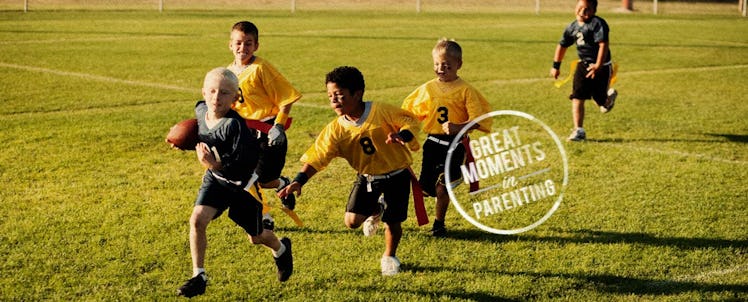How My Son Taught Me the True Meaning of Constructive Coaching
Learning to be both supportive and critical of your son at the same time is not always easy.

Welcome to “Great Moments in Parenting”, a new series where fathers explain a parenting hurdle they faced and the unique way they overcame it. This week, Chris, a 43-year-old personal trainer and father of two from Los Angeles, explains how being an assistant coach on son’s flag football team taught him the real meaning of constructive criticism — and how to be a more supportive father.
If you really want to have your parenting methods questioned, become an assistant coach. Not a head coach — the head coach has to be at every practice and every game. Assistant coaches basically need to understand the art of the high-five and how to set up cones. But, they still have an impact on the game and, most importantly, the players.
I am an assistant coach for my son’s flag football team. I’m great at high-fives, and I can set up cones like a boss. And the role brought me one of my greatest moments in parenting, although that moment came from one of my worst.
Last flag football season I assumed all the typical responsibilities of being an assistant coach, but I also had an experience that massively impacted my relationship with my son in an amazing way.
Normally, I’m a really positive coach – except when it comes to my son. If another player dropped a pass, or missed a block, I would tell them it’s okay. I’d “coach them up”, and tell them that they’ll nail the assignment next time. But, when my son would do the same thing – drop a pass, or miss an assignment – my reaction was totally different. “You should’ve had that!” I would yell. “How could you drop that? You’re better than that!” As parents, I think we’re harder on our own kids. We expect more. We want the best for them, and we hold them to a higher standard. It’s because we love them so much, right? Well, that’s what I used to think.
I’ll never forget the day we were driving home from a game. My son made a few mistakes, and, as usual, good old dad was really hard on him. I was feeling a little bad about it, actually, so I brought it up on the way home.
I gave him the usual dad speech, I think, about being the best he could. “Son, the reason I am so hard on you is because I want you to be your best and because I love you so much.” The response I got changed everything. My 9-year-old son said, “Dad, that doesn’t make sense. If you love me so much, more than anyone, why do you treat me the worst?”
I was speechless. He was right. He was absolutely right. From that day forward, my mindset changed. I’ve stopped becoming overly-critical with my son. I still “coach” him, but I try to be more constructive. I pump him up with positivity. I let him know that mistakes are okay, and that he will continue to improve as long as he learns from them.
Now, he’s the most frequent recipient of my world-class, assistant coach high fives, and my praise. I don’t coddle him, but I let him know that he’s doing a good job. If he’d kept playing under my old coaching approach, I’m sure he would’ve quit. In fact, he’s told me that. He fixed my thinking, and now my role as an assistant coach is one of the strongest ways we bond. He put me in my place and I couldn’t be happier about that.
Fatherly prides itself on publishing true stories told by a diverse group of dads (and occasionally moms). Interested in being part of that group. Please email story ideas or manuscripts to our editors at submissions@fatherly.com. For more information, check out our FAQs. But there’s no need to overthink it. We’re genuinely excited to hear what you have to say.
This article was originally published on